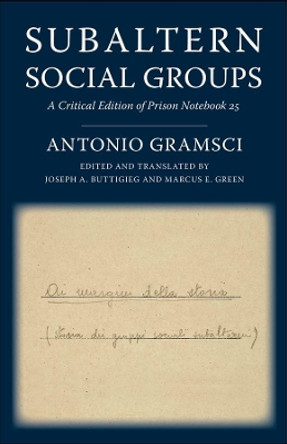Description
Among his prison notebooks, Gramsci devoted a single notebook to the theme of subaltern social groups. Notebook 25, which he entitled "On the Margins of History (History of Subaltern Social Groups)," contains a series of observations on subaltern groups from ancient Rome and medieval communes to the period after the Italian Risorgimento, in addition to discussions of the state, intellectuals, the methodological criteria of historical analysis, and reflections on utopias and philosophical novels. This volume presents the first complete translation of Gramsci's notes on the topic. In addition to a comprehensive translation of Notebook 25 along with Gramsci's first draft and related notes on subaltern groups, it includes a critical apparatus that clarifies Gramsci's history, culture, and sources and contextualizes these ideas against his earlier writings and letters. Subaltern Social Groups is an indispensable account of the development of one of the crucial concepts in twentieth-century thought.
About the Author
Antonio Gramsci (1891-1937) was an Italian Marxist theorist, one-time leader of the Italian Communist Party, and founder of the official party newspaper, l'Unita. Arrested and imprisoned by the Italian Fascist regime in 1926, Gramsci died before fully regaining his freedom. Gramsci's thirty-three prison notebooks, which contain brilliant reflections on a vast range of subjects, are foundational for an array of disciplines and schools of thought.
Joseph A. Buttigieg (1947-2019) was professor emeritus of English at the University of Notre Dame. He was the author and editor of a number of books, most notably the complete critical edition of Antonio Gramsci's Prison Notebooks (Columbia, 1992-2007). He was also the founding member and president of the International Gramsci Society.
Marcus E. Green teaches political science at Pasadena City College. He has published several articles focusing on Antonio Gramsci's political thought and subalternity. He is editor of the anthology Rethinking Gramsci (2011) and was coeditor of the journal Rethinking Marxism. He serves as secretary of the International Gramsci Society.
Reviews
The subaltern defined Antonio Gramsci's work. In this volume, Joseph A. Buttigieg's final gift to the world of Gramsci, devotedly assembled and fleshed out by his former student Marcus E. Green, we at last have the full view of how that definition came into being. A treasure. -- Gayatri Chakravorty Spivak, author of "Can the Subaltern Speak?"
Antonio Gramsci's Prison Notebooks have become a kind of Marxist oracle, a well-spring of pithy passages deployed in the service of interminable debates, especially around questions of culture, civil society, the state, history, and the role of intellectuals. On first glance, Gramsci's 3,000 pages of research, reflections, and analyses may appear random, disordered, even coded. But serious Gramsci scholars know better, and there are few as serious as the late Joseph A. Buttigieg and Marcus E. Green. Their painstaking and judicious reconstruction of Gramsci's writings on subaltern groups raises the bar, revealing with greater clarity the systematic development of his ideas on history, class struggles, folk culture, the state, the dynamic and contingent character of social movements, and the limits of a utopian imagination. This volume challenges us all to stop plumbing Gramsci's notebooks for jewels and take the work and its context as a whole. Our scholarship and our movements will benefit. -- Robin D. G. Kelley, author of Freedom Dreams: The Black Radical Imagination
Buttigieg and Green have done a remarkable job in making available to the English-speaking world this groundbreaking text of the leading Marxist thinker of the twentieth century. -- Cornel West, Union Theological Seminary
Essential reading for all those interested in Gramsci. By skillfully combining a thematic with a philological approach and including relevant notes from the other prison notebooks, the editors reveal the profoundly historical nature of their author's thought. History is never shoehorned into predetermined boxes. Gramsci's theoretical concepts emerge out of history itself. -- Kate Crehan, author of Gramsci's Common Sense: Inequality and its Narratives
Book Information
ISBN 9780231190398
Author Antonio Gramsci
Format Paperback
Page Count 288
Imprint Columbia University Press
Publisher Columbia University Press








